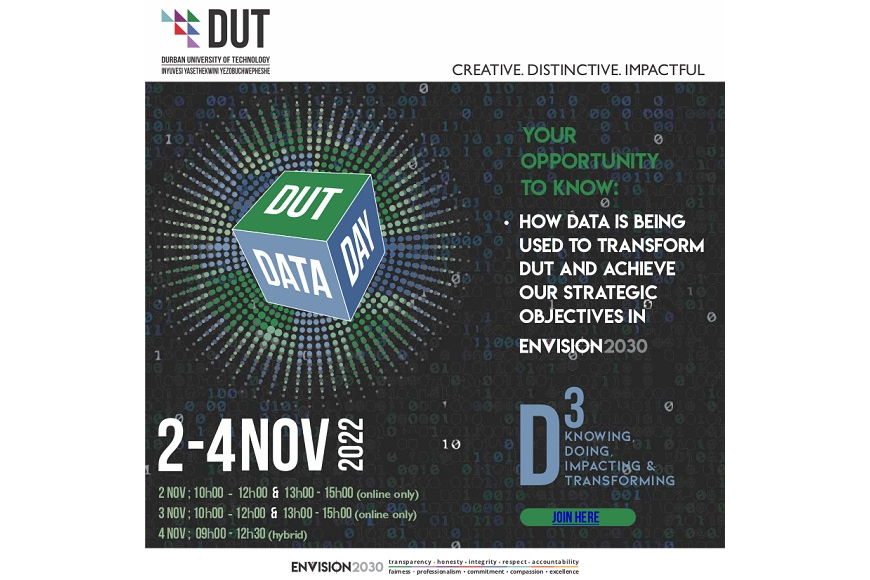Last week, the Siyaphumelela project based at the Centre for Excellence in Learning and Teaching (CELT) hosted its annual DUT Data Day which provides an opportunity for the DUT community to learn about various types of data at the university. Now in its fourth year, DUT Data Day showcases and celebrates how DUT staff use data to inform decision-making and action that move the university closer to achieving the strategic objectives in ENVISION2030. This year, the event was held over three days.
Dr Koo Parker, Siyaphumelela Institutional Researcher and the event organiser, explained that the Data Day theme, which is Knowing – Doing – Impacting – Transforming, is aligned to the Siyaphumelela (We succeed) project goal of building, and supporting a data (or evidence) led culture of decision making at the University. Data presentations and robust discussions aligned to the four perspectives of DUT’s strategic plan, namely Stewardship, Systems and Processes, Sustainability and Society, took place during morning and afternoon sessions over the first two days.
The Stewardship session was held on 2 November commencing with the first keynote by Dr Kavita Beemsen, Senior Director Institutional Planning, Monitoring & Evaluation (IPME). Her presentation was titled Unlocking Impact-oriented Data Insights for Stewardship of ENVISION2030: ENVISION2030 Strategy Tracker and emphasized the inter-connections between the various perspectives emanating from Stewardship that underpin the DUT Way. Other departments that made presentations aligned to the Stewardship perspective included the Disability Rights Unit, Student Counselling, Enterprise Risk Management and the Faculty of Management Sciences. A highlight of this session was Midlands Director, Dr. Joe Molete’s presentation on his vision for talent management and succession planning at the University.
The keynote address for the Systems and Processes session was given by Dr Progress Mtshali, Chief Information Officer titled The Impact of the new DUT Enterprise Resource Planning (ERP) System on Data Sharing across the Institution. This was followed by presentations from various departments including Information and Communication Technologies Services (ICTS), International Education & Partnerships (IEP), Real Estate Management, the Writing Centre, Management Information (MI), CELT and the Faculty of Accounting & Informatics. One of the highlights of this session was the presentation by Dr Nokuthula Mavela and Ms Shubnam Rambharos from CELT titled AutoScholar: Supporting student success through technology-mediated academic advising. AutoScholar, a Siyaphumelela project initiative, is DUT’s student tracking and advising system that connects securely to the ITS data centre and continuously analyses student assessment data using modern methods from the fields of Artificial Intelligence, Data Science and Statistics.
Student success is promoted by providing appropriate advice in time to improve performance and mitigate failure events. Automated advising makes it possible to advise large numbers far more cost-effectively than traditional methods. The DUT model focuses on AutoScholar as a tool providing real-time data to academic and support staff thereby enabling appropriate and timeous advising. Additionally, automation has the benefit of consistency and accuracy, and the barrier between a student under-performing and accessing advice is significantly reduced when a student has constant access to an advising method. Dr Mavela and Ms Rambharos’ presentation highlighted the ClassView Connect component of the AutoScholar Advisor system through a live demonstration of how students are identified as “at-risk”, how advice may be provided to them, and how correlations in academic performance between different modules in the programme for which students are enrolled provide a more holistic picture of student performance for academic advising.
On 3 November, the second day of the event focused on the perspectives of Sustainability and Society. Setting the scene in terms of Sustainability, was Mr Udesh Ramsundar, Director-Financial Operations & Accounting who spoke on: The Role of Financial Sustainability in ENVISION2030. He provided an informative keynote on how the university balances critical aspects including business continuity, investment in operations and educational infrastructure within a framework of good governance and conservative financial management to ensure financial sustainability.
Environmental sustainability and greening the campus were dominant themes under this perspective which were evident in the presentations by Dr Tamlynn Fleetwood of the Urban Futures Centre (UFC) and Dr Clive Greenstone.
Speaking further, Dr Greenstone from Town and Regional Planning posed questions pertaining to ‘greening’ and how to impact society in a transformative way through innovative solutions to its challenges, and how to become and remain sustainable. He explained how rooftop greening mitigates against urban heat islands (UHI) and stormwater run offs and the potential of the S Block and Library rooftops on the Steve Biko campus for developing urban rooftop gardens using local medicinal and endangered plant species.These projects should be integrated with the major infrastructural and real estate developments taking place through pilot projects such as rooftop farming and green roofs which could be generalised across other campus building rooftops.
The Society perspective was headlined by Acting DVC Research, Innovation & Engagement, Professor Keolebogile Motaung, who delivered an engaging and provocative keynote on turning a project into a start-up and the usefulness of MOUs and partnerships with international business for developing local entrepreneurship skills. Prof Motaung said start-up programmes must be integrated into the wider entrepreneurial ecosystem that addresses each of the stages of the start-up process, namely inspire-engage-accelerate. Presentations from departments including the UFC, CELT, Research & Postgraduate Support and the faculties showcased projects and initiatives that impact society to improve lives and livelihoods.
Prof Monique Marks and Dr Jennifer Houghton’s presentation gave insight into problems faced by cities such as Durban. Commissioned by the South African Cities Network, the Cities in Crisis project interrogated two Durban case studies, namely drug use and the homeless during COVID-19 lockdown, and the plight of informal settlements during the April 2022 floods. They spoke on new governmental approaches to deal with old ‘wicked problems, as well as rethinking local government principles, values and strategies.
The second day concluded with a robust question and answer session.
Pictured: A poster of DUT Data Day.
Dr Koo Parker, Dr Nokuthula Mavela, Waheeda Peters


